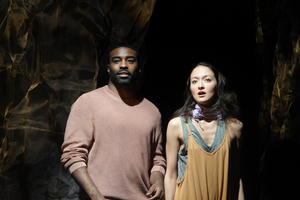Review: ON THE OTHER HAND, WE'RE HAPPY at Rogue Machine Theatre
The production runs at the Matrix Theatre until April 10, 2022.

Rogue Machine Theatre's latest offering, the American premiere of Welsh playwright Daf James' On the Other Hand, We're Happy opens in a cloud of cliches. Perhaps the whirlwind collage of the early stages of a relationship were once an exciting opening to a play, but after Duncan MacMillan's Lungs, Tanya Barfield's Bright Half Life, and Jason Robert Brown's The Last Five Years, the cheap banter and silly tropes fail to charm us.
At least those other works, respectively, delve into the affects of humanity on the environment, explore the nuances of queerness, and deliver some catchy tunes. As we enter the Matrix Theatre, we see the promise that "Rogue Machine Theatre is Having Difficult Conversations" (what does that mean?) and read Cameron Watson's director's note promising an evening of theatre that is timely (yawn), but there is neither environmentalism nor a showtune in sight. Stephanie Kerley Schwartz's Brillo pad set and the anything-but-subtle lights (Jared A Sayeg) and sounds (Christopher Moscatiello) even fail to convince us that this play will be anything to write home about.
And then a shift. The warmly charming Christian Telesmar and bubbly Rori Flynn, in the midst of a conversation about adopting a child, turn to the audience and ask for our input. What would we do? In this moment, the trajectory of our anticipations change, and the glories of James' play shine through. Rogue Theatre never lets the piece become a hokey pantomime, and we are not sitting, anxiously dreading some humiliating improv-comedy audience participation. Rather, our relationship to the narrative being carefully spun before us becomes intimate, immediate, and at moments, brutally difficult to separate from reality. Watson's ambulatory approach to the show, craftily set in the round, feels free and natural, but also intently choreographed to a point of poignant poetry.
All instances of audience participation are dealt with tactfully and with a charm belying the fact I was in the audience on opening night. We are intently aware of shifts in location, time, and character with little need of visual aid- in fact, at times, the visual aids in small costume pieces or hairstyles feel redundant and unnecessary. The trio of actors is mighty and could have presented this piece successfully with half of the already sparse design elements. In a montage sequence flashing through a young girl's life, Alexandra Helquist gives a cinematic performance, playing a photo-realistic child, then preteen, teenager, and young adult. (Is this what Florence Pugh thought she was doing in Little Women?)
It is, however, Christian Telesmar who capably carries the show. I've already used the word 'cinematic' once in this review, but don't have a better word to describe his performance. It is broad. It fills the space, yet its nuance is so secretive that it feels he never need raise his voice above a whisper. Just as it seems the playwright intends, Telesmar takes us on a specially individualized journey, and we feel for him and, by proxy, soar through his highs and lows.
Sadly, Rori Flynn is not supplied an equally human character, and the deck is stacked against her. Rather than a human woman, she seems to epitomize certain political views and comes off as an abstraction of a portion of the population. This is the only element in which the text falters. While it presents a gripping, thoughtful, and thought-provoking story about a man, it steadfastly reinforces an existing status quo.
Women, for fault of not being developed characters with equivalent heart and nuance, remain as props within a male narrative. Likewise, those identities already marginalized by society: the disabled, those living with HIV AIDS, those addicted to drugs, victims of abuse, those living with trauma, find themselves invited in to this story, but are kept pointedly from the heartfelt arch of our hero. Not every play can cover every narrative, but to introduce so much to the conversation and not confront the realities with serious care feels like a shortcoming on the behalf of Rogue Machine Theatre (who is supposed to be having difficult conversations.)
All in all, it is a play I am happy to have encountered. Tickets can be purchased here.
Reader Reviews
Videos

